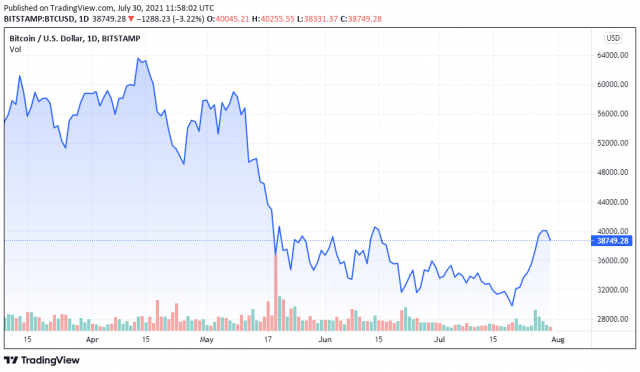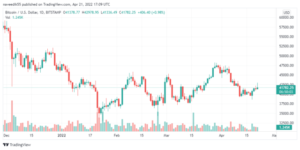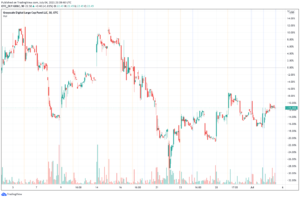It’s time to turn our heads to the Arabic world. How does the Qatar-based international news station Aljazeera sees El Salvador’s Bitcoin Law? Are they as lost as western media or can they handle themselves in the cryptocurrency space? Well, their journalistic report is balanced and complete. Aljazeera gives you the good and the bad. They’re still confused about a few concepts, but that’s ok.
Related Reading | President Nayib Bukele Explains El Salvador’s Bitcoin Law
We at Bitcoinist analyzed the American press’ coverage on one and two occasions. Now, it’s Aljazeera time. It all happened in their “Counting the Cost” show, which they describe as “A weekly look at the world’s top business and economics stories.” The episode’s title is “Can Bitcoin help power El Salvador’s economic growth?” The report uses a fast rhythm, it changes from topic to topic without even breathing.
Why Is El Salvador Using Bitcoin As Legal Tender According To Aljazeera?
- “El Salvador is a dollarized country. It doesn’t have its own currency. Interest rates and monetary decisions by the US Federal Reserve have a huge impact on El Salvador’s economy.” Two points we at Bitcoinist have made before. 1.- There is no one in El Salvador defending the Colón. 2.- The USA’s rampant money printing affects every Salvadoran.
- Since El Salvador doesn’t have their own currency, they can’t get their own Central Bank to buy their debts. The government has to resort to international investors, or the World Bank, or the IMF. “Bitcoin enables it to diversify its reserves.”
- This one is self-explanatory. “Remittances make up almost a quarter of El Salvador’s GDP. Traditional transfer companies charge fees, which means its losing out on money.”
Downsides To Using Bitcoin As Legal Tender
It’s not all fun & games, according to Aljazeera. El Salvador will face difficulties, and these are a few popular ones:
- Of course, they lead with volatility “The huge fluctuations in the price of Bitcoin is one reason.” Bitcoin will be volatile for the foreseeable future, so we don’t challenge this as a downside.
- “It’s not easy to cash out of Bitcoin,” according to Aljazeera. Fair enough, but it’s not that hard either. And El Salvador’s government announced a liquidity fund that will run under the whole operation.
- Aljazeera thinks there will be “less cash in the economy to fund growth.” Maybe, but, they will have more of the greatest asset ever created. And the greatest currency. Bitcoin.

BTC price chart on Bitbay | Source: BTC/USD on TradingView.com
Other Risks/ Concerns
- Al Jazeera thinks the move to accept Bitcoin will bring increased regulatory risk with it. Which is fair enough.
- And it comes with potential risk of “violation of anti-money laundering and terrorism financing standards.”
Live From Bitcoin Beach
The report changes gears and transforms itself into a mini-documentary about Bitcoin Beach. They give El Zonte full credits for changing the world, “The success of the Bitcoin Beach project has boosted the popularity of cryptocurrency in El Salvador. The government announced Bitcoin would become legal tender.” According to Aljazeera, the project’s aim is to use “blockchain technology to bring informal sector workers into a 21st Century economy.”
Bringing a much-needed balance to the piece, they bring out Carlos Alberto Carcash, a member of the opposition. According to him, “The moment Bitcoin becomes legal currency, problems appear.” And then, of course, he starts talking about volatility and the possibility of corruption.
Aljazeera Brings An Expert Witness To Close It All Off
From London, Naeem Aslam, chief market analyst with AvaTrade, joins them via Skipe. He “explains the case for and against El Salvador’s move to Bitcoin.” He talks about the mining sector and the possibilities it brings. Aslam goes into volatility because it’s the law. He discusses the possibility of draining the liquidity fund, and the possibility that it’ll expand.
The interviewer asks two interesting questions. If El Salvador turns to Bitcoin for remittances, will that drain their pool of Dollars? Since China banned Bitcoin mining, does that mean some of those mining machines are en route to El Salvador? Aslam doesn’t really know and starts speaking about geothermal energy and renewable sources.
Related Reading | Prominent Economist Warns Of International Sanctions Over El Salvador’s Bitcoin Law
Bizarrely, also about blackouts. He says there’s no evidence that Bitcoin mining could cause blackouts as if that was ever a possibility. The interviewer asks Aslam if the Bitcoin-virus could expand to other countries? He says El Salvador’s situation is unique because they don’t have a currency of their own. The interviewer suggests the fact that 80% of Bitcoin has already been mined might be a problem. The interviewee ignores him.
When they talk about crime, Aslam says that everybody knows that, “The dollar is the king when it comes to money-laundering issues.”
When he’s right, he’s right.
Featured Image: Screenshot from the report | Chart by TradingView
- &
- All
- American
- analyst
- announced
- anti-money laundering
- asset
- Bank
- BitBay
- Bitcoin
- Bitcoin mining
- Bitcoinist
- Boosted
- breathing
- BTC/USD
- BTCUSD
- business
- buy
- Cash
- Cause
- Central Bank
- challenge
- charge
- chief
- China
- Companies
- Corruption
- countries
- Credits
- Crime
- cryptocurrency
- Currency
- Dollar
- dollars
- Economic
- Economic growth
- Economics
- economy
- energy
- Expand
- Face
- fair
- FAST
- Federal
- federal reserve
- Fees
- follow
- full
- fun
- fund
- future
- Games
- GDP
- good
- Government
- Growth
- How
- HTTPS
- huge
- image
- IMF
- Impact
- interest
- Interest Rates
- International
- Investors
- issues
- IT
- King
- Law
- lead
- Legal
- Liquidity
- London
- Machines
- Market
- Media
- Mining
- mining machines
- money
- move
- news
- opposition
- Other
- pool
- Popular
- power
- price
- project
- Rates
- Reading
- Remittances
- report
- Risk
- Route
- Run
- Sanctions
- sees
- So
- Space
- standards
- Stories
- success
- talking
- Talks
- Technology
- Terrorism
- time
- top
- us
- Volatility
- weekly
- workers
- world
- World Bank











